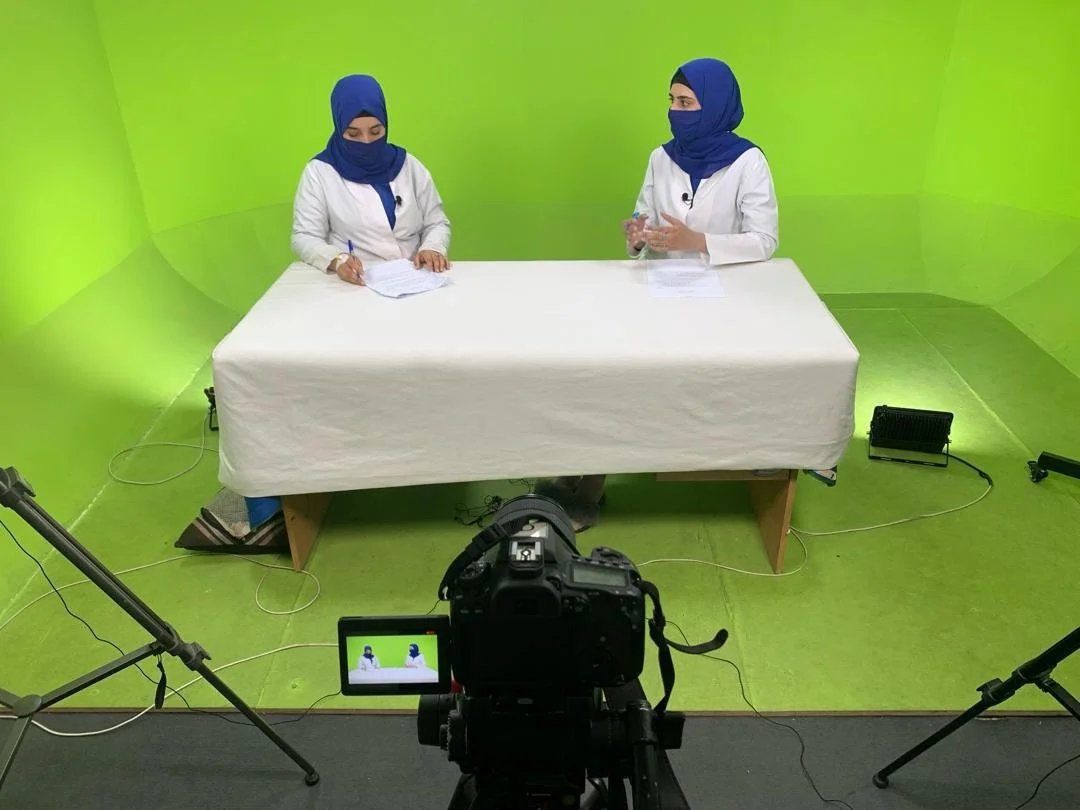Merging health education and television to make learning accessible for Afghan girls
“Despite the world's silence toward the Taliban's restrictions, I persisted in advocating for Afghan women's right to education.” (Photo courtesy of Marina)
On September 15, 2021 — after the Taliban returned to power in August of that year—they began instituting a gender apartheid system which barred girls from returning to school. Three years later, thousands of girls across Afghanistan have been denied the right to learn. By collaborating with organisations like Begum Organisation for Women — whose satellite channel will reach up to 1 million young people — Malala Fund is helping to keep education accessible. These efforts aim to restore not just education, but dreams, ensuring Afghan girls continue to learn despite the enormous challenges they face.
Studying medicine at Kabul University has always been a dream of mine and in 2015, I achieved it. I was accepted into the Curative Medicine faculty. I began my studies in 2016, but when the Taliban took over I was in my final semester and just a month away from graduation. Unfortunately, I was banned from the university.
After eight months, the Taliban briefly reopened universities, and I was fortunate to complete my degree in November 2023. During this period, I also undertook an 18-month internship program, spending most of my time in the General Surgery department, participating in over 300 surgeries. I also took part in research involving over 500 patients on the prevalence of hemorrhagic stroke and its correlation with sex, age, and history of hypertension.
Throughout my educational journey, I not only achieved top grades but also engaged in social and educational activities that empowered young women and children. For many years, I led a youth association and collaborated with medical and public health students to conduct awareness and training programs in various provinces across Afghanistan. We educated communities on cleanliness, the benefits of planting and proper medical practices for women during menstruation, pregnancy, and breastfeeding. In Kabul and Kapisa provinces, I promoted breast examination techniques to prevent breast cancer among young women.
“I dream of a bright future for all Afghan girls, where they can achieve their goals through the power of education and stand resilient against ignorance.”
Despite the challenges posed by the Taliban regime, which brought immense disappointment and restrictions, I became determined to be a voice for Afghan girls and women denied their fundamental rights, including education and personal freedom.
Education, being the cornerstone of society, became my focus. With schools and universities banned for women, I started teaching students from grades 10 to 12 science-related subjects via my YouTube channel. Although the impact was not as widespread as I had hoped, it fueled my desire to reach a larger audience. This led me to join the Begum Organization for Women in January last year, where I began working as an instructor, creating video lessons for mathematics and biology. Within a short period, I produced over 750 video lessons.
“I hope to continue my journey in medicine and become one of the best vascular surgeons in the world. I will do whatever it takes to achieve this goal while remaining a voice for Afghan women.” (Photo courtesy of Begum Organisation)
The launch of Begum Academy and Begum TV marked significant milestones in my teaching journey. Positive feedback from students validated the importance of my efforts. “Thank you for thinking about our suffering and for holding our hands through online lessons,” an 11th-grade student told me. “It helps us reach the unattainable dreams that were closed off to us by the doors of education."
I advanced to the role of Director at Begum Academy, where I led a team to further support student learning by providing access to videos and a question bank we developed. Additionally, I wrote the section of a 52-episode medical series focused on common problems in Afghan healthcare. I also helped produce over 150 medical programs on Begum Radio and Begum TV, merging my passions for education and health.
Marina recording videos for Begum. (Photo courtesy of Begum Organisation)
On Radio Begum, I dedicated three hours a week to discussing health issues affecting women and children in Afghanistan — from gynaecology to paediatrics. We received at least 15 phone calls during each program, where I guided women on their health concerns to the best of my ability. On Begum TV, my health program was divided into sections: discussing specific diseases, debunking incorrect health information, and answering questions received via social media or from our reporters.
Being part of the Begum Organization has been the most impactful and fulfilling experience of my life. Despite the world's silence toward the Taliban's restrictions, I persisted in advocating for Afghan women's right to education.
I hope to continue my journey in medicine and become one of the best vascular surgeons in the world. I will do whatever it takes to achieve this goal while remaining a voice for Afghan women. No matter the challenges, I will not stop until my story reaches its conclusion.
I dream of a bright future for all Afghan girls, where they can achieve their goals through the power of education and stand resilient against ignorance. I will continue my efforts today, tomorrow, and for as long as it takes until there are no more restrictions or limitations for girls in our society. I want to see Afghan women respected as equal members of society. I will keep striving until the day I can proudly express my joy, free from oppression, as every human being deserves.














































